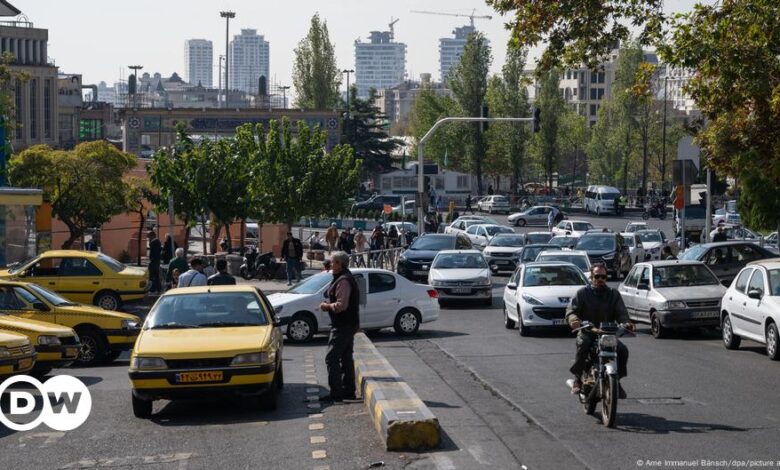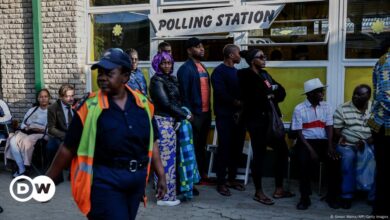Iranians upset with Tehran over Israel tensions – DW – 10/26/2024

In the wake of Israel’s military strikes on Iranian targets early on Saturday, many people in Iran are turning to social media to voice their frustrations and try to understand what’s happening.
Israel flew aerial attacks against military targets in Iran with pre-dawn airstrikes in retaliation for the barrage of ballistic missiles the Islamic Republic fired on Israel earlier this month.
As the country is already in economic turmoil with the national currency collapsing and inflation soaring, many Iranians are increasingly questioning the government’s priorities, feeling the weight of a regime that appears more focused on foreign conflicts than addressing the dire needs at home.
This disconnect between official narratives and public sentiment could have far-reaching implications for Iran’s internal stability should tensions escalate on the military front.
Censorship kicks in
Iran is “one of the world’s most repressive countries in terms of press freedom,” according to Reporters without Borders.
The tight censorship was visible in the direct aftermath of the Israeli strikes, with Iranian state media initially remaining silent on the attacks.
This was in sharp contrast to the dynamic social media activity within the country, where people used VPNs to circumvent online restrictions to share videos of bright lights in the sky and loud noises on platforms like Telegram and X.
At the same time, accounts linked to Iran’s intelligence and security apparatus warned on social media that sharing images with foreign media could be deemed espionage.
Eventually, some official Iranian news sources conceded that an attack had taken place but claimed that Iranian defenses had successfully intercepted the strikes.
State-aligned media and social channels have continued to downplay the severity of the attack. Telegram channels associated with Iran’s Revolutionary Guard, for example, shared images on Saturday morning of crowded squares in Tehran’s center, insisting that nothing significant had occurred.
Several government-affiliated journalists also broadcast from busy public areas of the capital, Tehran, on Saturday, asserting that life was continuing as normal.
A Tehran-based journalist, who DW is not naming for safety reasons, told DW on Saturday that “nothing can be written.”
“The media dare not write anything other than the official stance. Journalists have been prohibited from posting on their personal social media pages,” they wrote in a message.
Seeking information from outside Iran
Babak Dorbeiki, a former advisor and head of the Public Relations and Information Center of the Ministry of Culture during Hassan Rouhani’s government, criticized the constraints on independent media following Israel’s attack.
“The state media’s handling of news during crises shows ongoing weaknesses, marked by confusion and a lack of coordination,” he told DW from London, where he is now based.
As Iranians usually do in a volatile situation, they seek information through Persian-language media based outside the country and from Iranian journalists active on X.
Many on social media expressed anger toward the government, questioning why they had not been informed of the attacks to seek shelter. They also raised concerns about the lack of shelters as the country possibly edged closer to war.
People also showed their frustration with the leadership of the Islamic Republic, with some attributing escalating military conflict with Israel to the reckless pursuits of Supreme Leader Ayatollah Ali Khamenei and the Islamic Revolutionary Guard Corps, Iran’s state armed forces charged with defending the revolutionary regime.
Antisemitic propaganda unsuccessful
According to an analysis by the collaborative news site IranWire, “antisemitic hate speech on Persian social channels and websites reached a total volume of about 61,000 posts in September.” That is a 98% rise from August, IranWire found, and official and semi-official channels “led the charge in spewing this antisemitic material.”
But these government efforts to incite sentiment against Israel and general antisemitic sentiment have failed to stir anti-Israel protests in Iran — even as Arab countries have seen mass demonstrations against Israel since it launched its war against Hamas in Gazain response to the October 7 terror attack.
But as historian Arash Azizi, a visiting fellow at New York University who researches Iran, wrote in The Atlantic, “the people of Iran have no desire to experience a war with Israel … [and] harbor very little hostility toward Israel.”
Indeed, social media reactions after Saturday’s strike also suggest that many Iranians don’t want a conflict with Israel amid concerns of a regional war breaking out.
In fact, opposition activists fear that all out war on Israel could make life even worse for Iranians.
“The reality is that war leads to increased repression and pressure on dissenters, which does not contribute to democracy in Iran,” Nazila Golestan, a Paris-based opposition figure to the Iranian government, told DW.
Economic turmoil expected to worsen
The Iranian economy is already in severe turmoil amid the tensions with Israel and concerns of a regional war. The Iranian local currency, the rial, plummeted to unprecedented lows against the dollar earlier this week and the inflation rate has surged by 33% over the past year, according to official figures.
Meanwhile, investors are rapidly seeking to liquidate their assets on the Tehran Stock Exchange, leading to a halt in major transactions as many await the outcomes of these conflicts.
Markets are bracing for further increases, should hostilities with Israel intensify, and prices are expected to surge sharply.
Many Iranians are increasingly linking their country’s economic collapse to the government’s financial support of Hezbollah and Hamas.
Citizens express frustration over resources being allocated to foreign conflicts while domestic needs go unmet. As everyday life becomes increasingly untenable due to rising prices and inflation, there is a growing sentiment that government priorities are misplaced, fueling public anger and calls for accountability.
“Even if the war does not escalate, the decline of the rial against the dollar will continue,” said Alireza Salavati, a London-based economic analyst. “Additionally, the price of gold is also expected to rise. These issues are linked to the growth of liquidity, sanctions, and the psychological impact of the Iran-Israel conflict.”
Edited by: Kate Hairsine and Andreas Illmer




